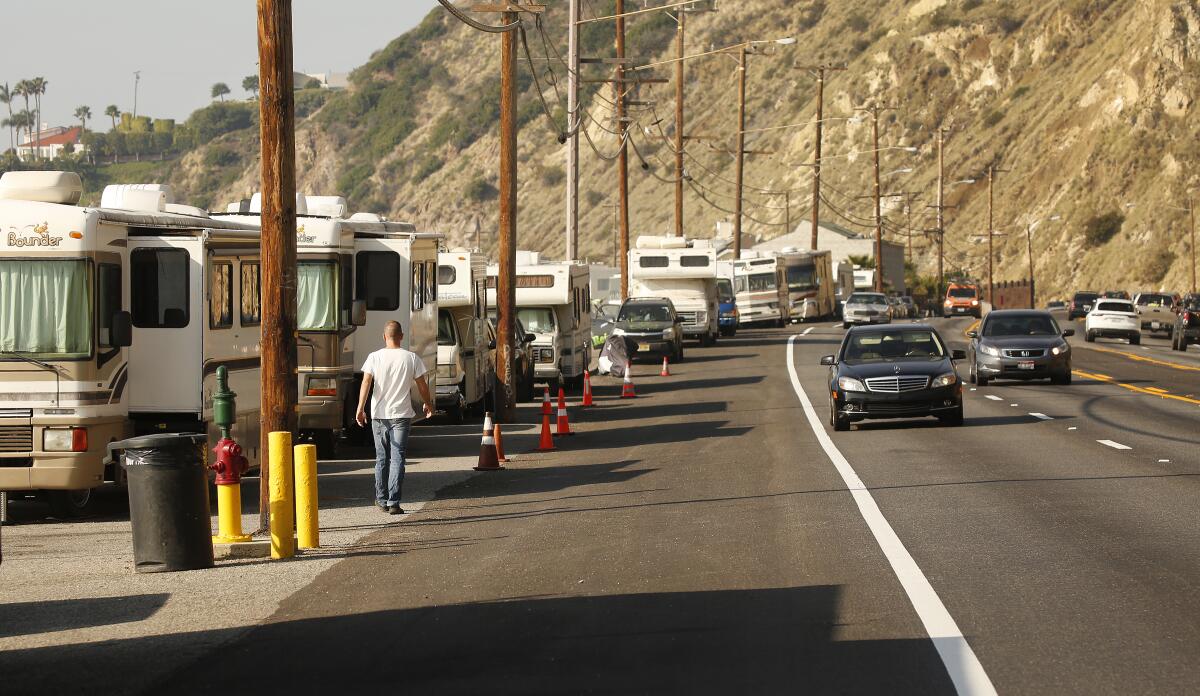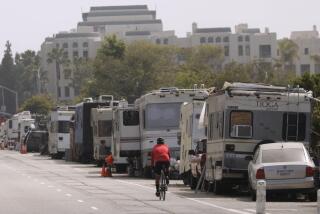Editorial: Yes, homeless people have a right to park on Malibu’s coast. But not for weeks at a time

- Share via
The fabled coastline of Malibu beckons residents, tourists, swimmers, surfers — and, now, homeless people. In the last few years, homeless people living in their vehicles, mostly RVs, have essentially taken up residence along parts of Pacific Coast Highway in Malibu. In a way, their presence is proof that access to the coast is, indeed, guaranteed to all the public by the state’s landmark Coastal Act.
But does public access mean someone can stake out a parking spot on Pacific Coast Highway overlooking the beach indefinitely? That’s as gnarly a question as some of the waves offshore.
The number of vehicles parked in Malibu has increased over the last few years. In the 2019 homeless count, 61 vehicles, with 93 people living in them, were tallied in the city of Malibu, according to Los Angeles Homeless Services Authority officials. A year later, during the most recent homeless count last month, Malibu city officials say that 83 vehicles were tallied.
That’s a small fraction of the 9,981 vehicles that provide shelter for more than 16,500 of the nearly 59,000 homeless people in Los Angeles County overall, according to the 2019 count.
But the presence of dozens of vehicles camped out along the coast for indefinite periods raises questions about whether they are unfairly tying up limited and sought-after parking spaces — spaces that are supposed to be available to Californians generally, and shared among them. It also presents environmental problems, as some of the RVs have been dumping their septic tanks on the road and into storm drains.
For those reasons, the city of Malibu has proposed restricting overnight parking along quarter-mile stretches near Las Tunas Beach and Malibu Pier — both areas that have attracted homeless people in recreational vehicles. The overnight restrictions would forbid parking from midnight to 2 a.m. on one side of the road and from 2 to 4 a.m. on the other side. There would never be a time when there is no parking at all, but the rules would clearly discourage overnight parking. The restrictions would have to be approved by the California Coastal Commission and could be appealed to the commission by anyone who objects — and Malibu officials say an appeal is likely.
These parking restrictions seem reasonable. Homeless people have as much right to access parking along the coast as anyone else. But they don’t have the right to commandeer sought-after parking spots along the coast for weeks or months — any more than other visitors in cars have the right to hog parking spots (or any more than beachfront property owners have the right to keep the beach all to themselves). Nor do people in RVs, homeless or otherwise, have the right to pollute the coast by dumping their septic tanks on the road.
While there are some vehicle dwellers who are vacationers, most are believed to be homeless and from the Los Angeles area. City officials say they know of at least a handful of people living in vehicles whose homes in Malibu were destroyed in the devastating Woolsey fire of late 2018.
Ordinarily, this page is reluctant to see the authorities roust homeless people from where they’re sleeping unless there’s a plan for where they should go; without alternatives, the homelessness problem just migrates from one area to another. To the credit of city officials in Malibu, they have pledged to find overnight safe parking venues for people living in their vehicles and to explore setting up shelter at the closed Malibu Courthouse building. “No community is going to wish this away,” Malibu Mayor Karen Farrer said. “We want to take a comprehensive and empathetic approach.” The city has already approached churches about using their parking lots for overnight safe parking — and been turned down. So city officials have a challenge ahead.
They will probably have to demonstrate they have something in the works to get the approval of the Coastal Commission, which has seen homeless encampments and vehicle parking increase up and down the coast. The commission has generally not allowed communities to put restrictions on access to the beach or parking unless the communities have come up with an alternative to offer homeless people.
It’s a classic balancing question. The coast should be accessible to everyone and should be safeguarded against environmental dangers. But if that means restricting the ability of homeless people to stay overnight, we hope that the city of Malibu will help find them alternative places to park and, even better, a path to services and housing.
More to Read
A cure for the common opinion
Get thought-provoking perspectives with our weekly newsletter.
You may occasionally receive promotional content from the Los Angeles Times.










